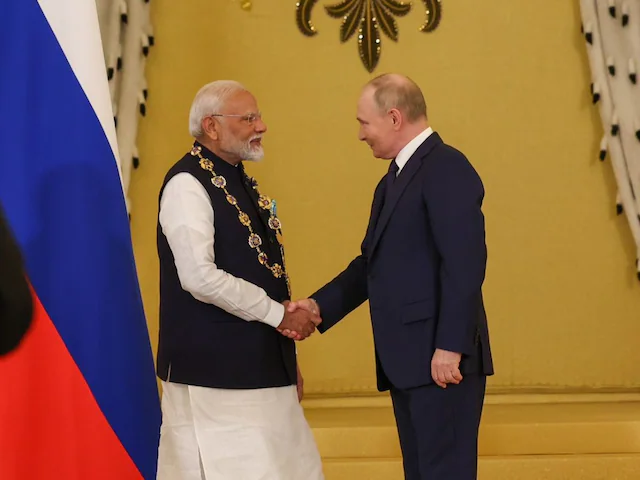Opinion | PM Modi’s Russia Visit: A Symbolic Dimension
- By : Dr Anirban Ganguly
- Category : Articles

In a historic moment, as Prime Minister Narendra Modi was being conferred Russia’s highest civilian award, the Order of Saint Andrew the Apostle the First-Called, by President Vladimir Putin within the historic precincts of the Kremlin, one’s mind wandered to the innumerable scholars and thinkers who shaped the India-Russia narrative over decades and centuries. The award’s conferment marked a symbolic high point of PM Modi’s Russia visit and his participation in the 22nd India-Russia Summit. The time-tested partnership and camaraderie today stand on deeper civilisational connections and foundations.
The joint statement, the outcome document, reflected the ever-expanding areas of cooperation and partnership. These ranged from national security, energy, transport and connectivity – including the crucial Chennai-Vladivostok corridor – to Arctic and Far-East issues, nuclear and military cooperation, counter-terrorism, science and technology, culture, and education. The joint statement emphasised the essential upholding tenets of this unique relationship, stating that both sides “noted with satisfaction the resilience of India-Russia Special and Privileged Strategic Partnership and the convergent and complementary approaches of their foreign policy priorities, and reaffirmed their commitment for its further strengthening. They stressed that India and Russia as major powers will continue to strive for global peace and stability in a multipolar world”. In the last decade, under PM Modi’s leadership, this resilient partnership has grown even stronger.
Undeterred by scepticism in certain Western circles, Prime Minister Modi and President Putin have injected fresh energy and a new dimension into the partnership, taking it to the next level with a renewed roadmap and focus. That is how it should be, for both Russia and India are in the process of charting out their respective paths in the evolving global landscape, with each resolutely protecting its national interest.
When PM Modi dedicated the Order of St. Andrew the Apostle to 140 crore Indians, it was a reiteration of the cultural and spiritual bond between our two civilisations. This moment recalls one of Russia’s most well-known Indologists and Padma Bhushan awardee, E.P. Chelyshev (1921-2020), who dedicated his life to studying India, Indian culture, literature, Swami Vivekananda, and the Ramakrishna movement. Chelyshev’s fascination with Vivekananda perhaps equalled that of Tolstoy’s with the Swami, in another age and time. It is these individuals, devoting their lives to understanding India and Russia and assessing each through the prisms of the other’s aspirations, hopes, and expectations, who have laid a foundation upon which the future course can be safely built, erected, and further enriched.
As a young scholar in 1956, Chelyshev swam across the stretch of sea and climbed the iconic rock in Kanyakumari. The description of his exertion and experience is a moving one. “Far out on the sea,” Chelyshev recalled, “like a flock of quaint birds, the sails of light fishing boats dived in and out of the waves, while south of the rocky cape, some 200 metres from the shore rose a lonely cliff, against which the waves noisily beat. ‘The cliff of Swami Vivekananda,’ I was told by a young man standing nearby who evidently understood that I was admiring the majestic beauty of the granite islet. On hearing the name of Vivekananda, about whom I first learned while a student from the works of Romain Rolland, I came up to the young man. ‘Yes, it was on this cliff that Swami Vivekananda had spent three days before leaving India and setting out for distant lands’, he said. ‘How I would like to visit that islet,’ I remarked.”
Not waiting for the young man to fetch a boat from a nearby fishing village, Chelyshev plunged into the waves, “my desire to step onto Vivekananda’s cliff was so great that without waiting for the young man’s return, I decided to swim to the islet.” The boat carrying the wildly gesticulating young man eventually came, but by then Chelyshev, halfway through, had reached the mighty cliff. The young man, Chelyshev’s newfound friend and guide, told him, “Sit down and think of the one who indicated to us the road to a new life.”
Chelyshev followed his advice. “Only the anxious cries of seagulls and the rumble of the surf broke the silence…Everything I read about Vivekananda came to my mind. I recalled the words of Tagore that he who wants to understand India must read Vivekananda, that he awakens in the younger generation love for, and devotion to, their motherland, their pride in its past and hope for its bright future. This indeed is so. Reading and re-reading the works of Vivekananda each time I find in them something new that helps deeper to understand India, its philosophy, the way of life and customs of the people in the past, present, their dreams of the future…I thought of his life, brief but dazzlingly bright, full of indefatigable activity and an impassioned desire to make his compatriots aware of their greatness and lead them onto the road of a new life.”
Regarding the Swami’s message, Chelyshev, who went on to become a towering authority on India, observed that “it possesses many features of active humanism manifested above all in a fervent desire to elevate man, to instill in him a sense of his own dignity, sense of responsibility for his own destiny and the destiny of all people, to make him strive for the ideals of good, truth and justice, to foster in man an abhorrence for any suffering…”
Even today, more than a century after discovering Vivekananda, Leo Tolstoy’s fascination with the Swami continues to intrigue. On September 13, 1896, Tolstoy wrote to one Anendra Kumar Datta, who had sent him Swami Vivekananda’s lectures on Raja Yoga, that he found the book “most remarkable” and had “received much instruction from it”, especially on the metaphysical side of the doctrine. For Tolstoy “the precept as to what the true ‘I’ of a man is,” as expounded by Vivekananda, was “excellent”. “So far”, he wrote to Datta, “humanity has frequently gone backwards from the true and lofty and clear conception of the principle of life, but never surpassed it”.
From Swami Vivekananda’s letters, one can surmise that he had hoped to visit Russia sometime in April 1897. That visit could not materialise. But ripples of his thoughts and words had already reached the wide and rich shores of Tolstoy’s empire of thought and meditation.
Iconic French philosopher Romain Rolland, himself a biographer of Sri Ramakrishna and Swami Vivekananda, has lamented that it was the ‘misfortune of mankind that Vivekananda, in the course of his travels in Europe in 1900,’ was not advised to go to Yasnaya Polyana, Tolstoy’s ‘inaccessible literary stronghold’, where he lived, contemplated and produced his chef d’oeuvres. The two ‘religious geniuses of Europe and Asia’, thus, could not meet. That meeting of minds, had it happened, would have undoubtedly been a striking and defining encounter.
Tolstoy, reading Vivekananda, took copious notes, compared his thoughts and understanding with that of the Swami’s and urged his acquaintances and acolytes to do the same. Sri Ramakrishna’s aphorisms particularly attracted Tolstoy. In them, he found much that was the same as his own understanding. Some of these sayings, in a revised form, found a place in Tolstoy’s books: [Sayings] for Every Day, Circle of Reading, and Path of Life. Sri Ramakrishna’s ‘Kathamrita’ too profoundly impacted Tolstoy.
In a conversation with Dilip Kumar Roy, Bengali composer and poet, Romain Rolland, with whom Roy had a close literary and intellectual connect, spoke of how “Tolstoy in the last years of his life, was charmed by Vivekananda’s writings.” “Tolstoy’s close friend P. Biryukov”, Rolland told Roy, “and numerous scholars keep chanting Vivekananda’s name even now. In Russia, especially, there are even more of such people…” In an article on education in May 1909, a little over a year before his death, Tolstoy spoke of Vivekananda as “amongst the best thinkers of the world, alongside Socrates, Rousseau, Kant etc.”
In his famous “Letter to a Hindoo,” written to the young revolutionary nationalist Tarak Nath Das in December 1908, Tolstoy, responding to a request for support for India’s freedom struggle, drew upon Swami Vivekananda and a wide range of Indian religious thought. Tolstoy also cites the Tirukkural in his historic response. This letter, which attracted Mahatma Gandhi to Tolstoy, significantly influenced the evolution of Gandhi’s political thinking.
The significance and symbolism of PM Modi, who has been profoundly impacted and shaped by Swami Vivekananda’s legacy, being conferred Russia’s highest civilian honour is, in a sense, a culmination of that rich stream from the past. It is a stream that continues to rejuvenate and instill hope. It is a stream that needs to be kept fresh and induced towards continuous self-renewal. In its continuity will emerge greater credence and meaning to the India-Russia civilisational partnership for our times.

















